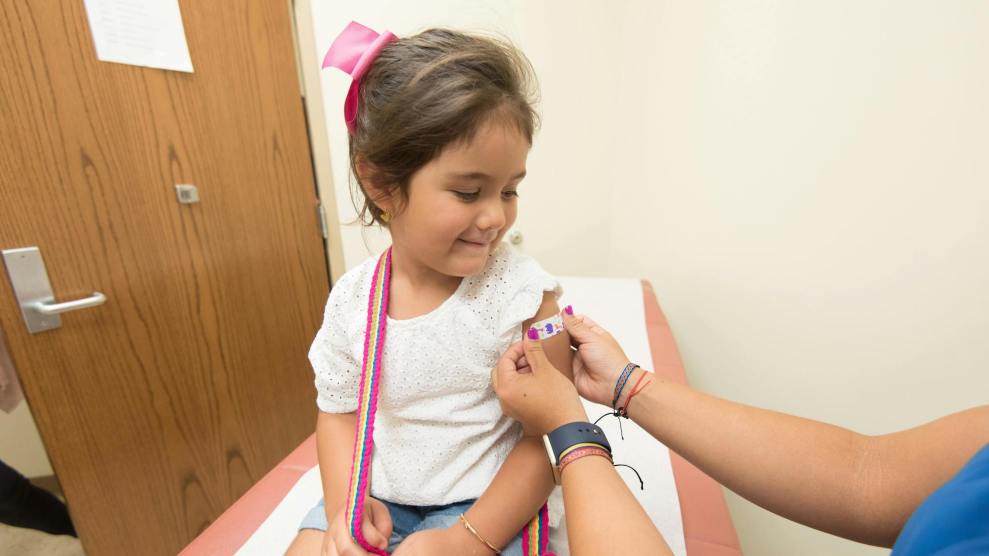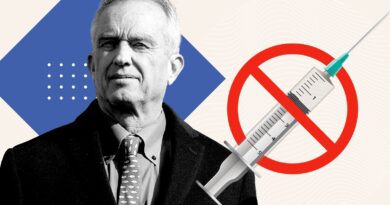New Hampshire’s GOP Is Taking a Stand—Against the Polio Vaccine

Centers for Disease Control and Prevention
New Hampshire could soon beat Florida—known for its anti-vaccine Surgeon General—when it comes to loosening vaccine requirements. A first-in-the-nation bill that’s already passed New Hampshire’s state House, sponsored only by Republican legislators, would end the requirement for parents enrolling kids in childcare to provide documentation of polio and measles vaccination. New Hampshire would be the only state in the US to have such a law, although many states allow religious exemptions to vaccine requirements.
Currently, Republicans control New Hampshire’s state House, Senate and governor’s office—but that isn’t a guarantee that the bill will be signed into law, with GOP Gov. Chris Sununu seemingly flip-flopping when it comes to disease control. Sununu did sign a bill in 2021 allowing people to use public places and services even if they did not receive the Covid-19 vaccine. But the next year, the governor vetoed a bill that would bar schools from implementing mask mandates.
The polio vaccine, first offered in 1955, and the MMR shot, which treats the highly infectious measles, mumps, and rubella viruses, are two very crucial vaccines both in the US and internationally. Since the year 2000 alone, vaccines against measles are estimated to have saved over 55 million lives around the world.
The CDC recommends that kids get their first dose of MMR vaccine between 12 and 15 months of age, and a first dose of the polio vaccine at around two months old. All states currently require children to have at least started vaccination against measles and polio in order to enroll in childcare, according to the nonprofit Immunize.org. A CDC report found that for the 2021-2022 school year, around 93 percent of children had received the MMR and polio vaccines by the time they entered kindergarten. That figure drops to less than 80 percent for both vaccines—the lowest rate in the country—in Alaska, where a measles outbreak could be devastating.
Rises in anti-vaccine sentiments have largely been linked to concerns that vaccines cause health issues, like the debunked claim that the MMR vaccine leads to kids being autistic. What parents may want to keep in mind is that polio and measles themselves are disabling conditions: according to the World Health Organization, 1 in 200 polio infections leads to irreversible paralysis. Children who get measles can experience symptoms including swelling of the brain. Death is always a possibility, too.
“Childhood vaccines have helped protect generations of Americans from potentially devastating vaccine-preventable diseases,” S. Wesley Long, a professor of pathology and genomic medicine at the Houston Methodist medical center, told Mother Jones. “Many of these diseases still exist around the world, and we rely on our collective immunity, often from childhood vaccines, to prevent these diseases from circulating in our population.”
The bill would strike language requiring that immunization records be submitted to childcare agencies, but would keep those requirements for students enrolling in kindergarten through 12th grade. As of 2022, according to the nonprofit ChildCare Aware of America, there are some 700 licensed childcare centers and homes in New Hampshire (which doesn’t require the Covid-19 vaccine for enrollment in childcare, either, despite its efficiency in reducing both death rates and acute symptoms).
Vaccine hesitancy is rising among parents of young children. A 2023 survey from the Pew Research Center found that around half of parents with kids four or younger thought that not all standard childhood vaccines—a list that also includes hepatitis B, rotavirus, DTaP and chickenpox—may be necessary. Anti-vaccine misinformation plays a role in this phenomenon, which began before the Covid-19 pandemic, but has certainly increased since. In a 2019 UK report, about 50 percent of parents of young kids encountered false information about vaccines on social media.
While it’s nice when a beloved celebrity makes a comeback, comebacks of the very infectious measles and polio epidemics are less welcome. As New Hampshire’s state epidemiologist, Dr. Benjamin Chan, said during a state Senate hearing on the bill, “as vaccination levels decrease, this is putting our children and our communities and our childcare agencies at risk.”


